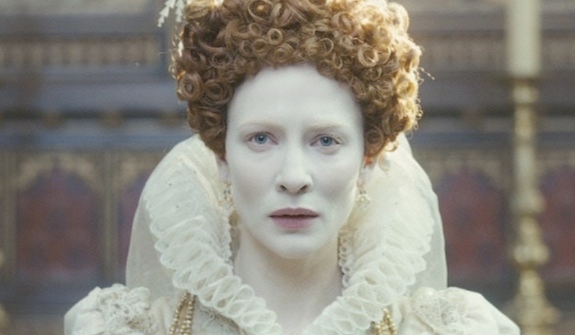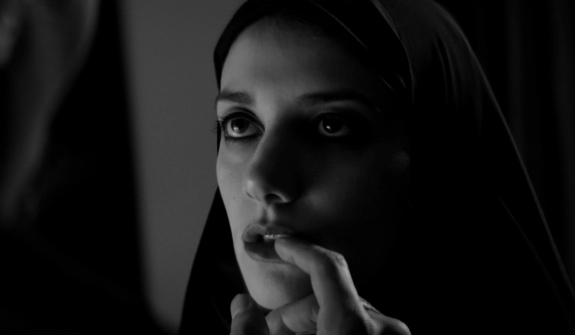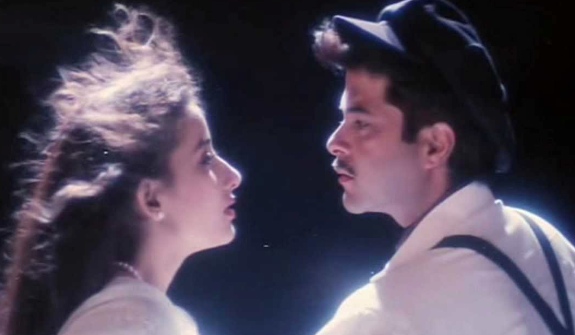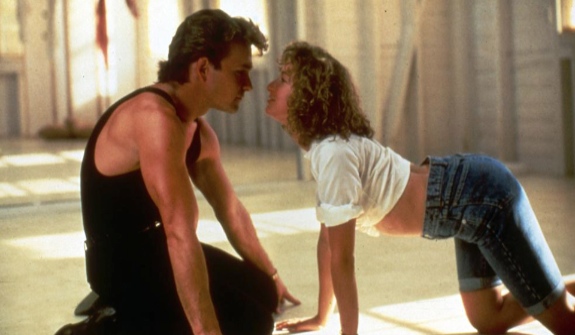
Are you ready for the summer?
Are you ready for the sunshine?
Are you ready for the birds and bees,
The apple trees,
And a whole lot of fooling around?
Sung by a chorus of young children, the theme song from juvenile comedy classic Meatballs promises summer camp as a hot and steamy (parent-free!) paradise for the burgeoning hormones of teens and pre-teens to run amok. We asked Fatima BG (Black Girls Talking), Manisha Aggarwal-Schifellite (The Hairpin, The Toast, cléo) and Veronica Fitzpatrick (The Brink) to discuss the fraught sexual politics of female coming-of-age and the relaxed social mores in Dirty Dancing (Emile Ardolino, 1987), Addams Family Values (Barry Sonnenfeld, 1993), Little Darlings (Ronald F. Maxwell, 1980), and Friday the 13th (Sean S. Cunningham, 1980). – the cléo editors
Dirty Dancing
FATIMA: Dirty Dancing is a great illustration of the intersection between camp and coming-of-age stories. Although Baby (Jennifer Grey) is older than most protagonists in films of this genre at 17, her life before going to the Kellerman family resort is sheltered and naïve in the way that makes sense for someone without much life experience. I like that it’s in this idyllic camp setting that she gets a crash course in class and gender inequities—back ally abortions!—and begins to understand just how shielded she has been from the general messiness of life. But in order for those lessons to be learned, she has to engage in the time-tested tradition of sneaking around behind her parents’ backs. Her relationship with Johnny (played by the much older Patrick Swayze) is almost secondary to these other story elements, even though plot-wise, it’s clearly supposed to be the main attraction.
MANISHA: It’s so ironic that at a place that’s so physically isolated and in the wilderness, Baby comes into contact with so many different kinds of people from the outside world, or at least, the world with which she is very unfamiliar. (Which speaks to the film’s time period too, 1963, and the coming sexual revolution.) The sex with Johnny is also symbolic within the context of Baby’s coming of age, especially contrasted with the abortion storyline and Penny (Cynthia Rhodes). It’s an interesting dynamic that shows how fraught sex and adult relationships can be, even if they are consensual and loving.
VERONICA: Definitely amid, or even supplanting the hetero love story, are the important female friendships emerging in the film. Like when Penny thanks Baby in the dressing room scene for taking her part in the show so that Penny can see a doctor for the “procedure,” or between Baby and her sister Lisa (Jane Brucker), whose love is coded in the (admittedly weak) concession that Baby is pretty “in her way.”
FATIMA: Yes! Also adding to this is the way Baby confronts the rich and Ivy League-bound Robbie (Max Cantor) about Penny’s pregnancy and his scumbag antics, standing up for both Penny and Lisa in the process. I like to imagine a sequel in which Baby, with her newfound knowledge, goes out into the world and meets a bunch of hippies, tries LSD and becomes a cult leader, bringing it all full circle, as they set up their commune at a camp. Dirty Dancing: The Lost Years.
MANISHA: YES PLEASE!
VERONICA: I completely agree that Dirty Dancing is as much about class as it is coming of age, fundamentally altering what camp means by dividing the people who run it and the people who (get to) go. Then sex both articulates and transgresses the division, as we see woozy guest Mrs. Pressman (Miranda Garrison) attempt to keep what appears to be an ongoing private appointment with Swayze’s Johnny Castle, and hear Johnny tell Baby about being used by the rich, sexually available resort patrons. For them, sexual attention is just another service, a need that he as a staff member is obligated to anticipate and fulfill. Sex is impressively supple in Dirty Dancing: obviously dangerous–potentially lethal in the case of Penny’s rusty abortion – but also linked to intimacy and intuition, as when Johnny uses the heartbeat to teach Baby the merengue’s time signature. Most interestingly to me, sex-in-dance invokes contemporaneity; the current rock and roll movement encroaches on the tired mambo routine. There’s a sense at the end of bringing everyone up from their seats, from the past into the present and future.
FATIMA: Sex-in-dance also invokes class here, as Baby is first introduced to the idea of dirty dancing as something that the workers do in private, away from the stiff choreographed world of the camp’s rich patrons.
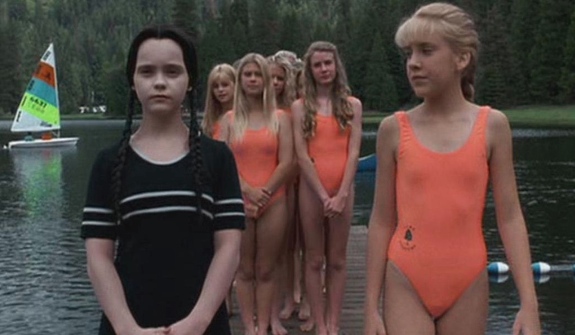
Addams Family Values
MANISHA: Instead of an idyllic setting ripe for self-discovery, it looks like camp might be the place that breaks Wednesday Addams (Christina Ricci). But by the end of Addams Family Values, it’s clear that camp has helped to strengthen her sense of self, despite how weird she seems to everyone around her. Wednesday’s romance with Joel (David Krumholtz) is secondary to her revenge plot against the other girls and the camp directors, which is the real indicator of her emotional direction in the movie.
FATIMA: I love that Wednesday went to camp and came out a more seasoned felon-in-training, with a few escape and murder attempts under her belt. The Joel romance is indeed secondary, as you said, Manisha, and Joel’s feelings for her are based entirely on Wednesday’s unshakable sense of self, which we get to see on full display at camp.
MANISHA: Camp is where Wednesday and Pugsley (Jimmy Workman) experiment with normalcy, which of course is not normal to them. It’s where they experience a totally different way of being and living (like Baby in Dirty Dancing), and in particular, it’s where Wednesday experiments with romance in a different way than her parents show affection to each other, which is so over the top. Wednesday uses her time at camp to see how she feels about Joel, and how she feels about romance in general.
VERONICA: Even leaving camp aside, Addams Family Values leads with sex – with Morticia (Anjelica Huston) slipping into labour; a nurse attempting to give Wednesday and Pugsley “The Talk” as they wait; and Wednesday, expressionless, asserting her undomesticated knowledge of the situation: “They had sex.” If the film doesn’t need camp-as-context to introduce sex as fucking, camp does supply sex in terms of gendered coercion here: the boy/girl splitting that’s endemic to camp, and Amanda Buckman (Mercedes McNab) as Wednesday’s wispy foil.
Also foiling is the dual romance plot with Uncle Fester (Christopher Lloyd) and Debbie (Joan Cusack). Their coupling is manipulative and carnal, as Debbie leverages sex to isolate Fester from his suspicious family (my favourite moment is when Morticia recognizes and tips her hat to this: “You have placed Fester under some strange sexual spell. I respect that”). The young, actually-at-camp romance is comparatively benign: Wednesday finds herself attracted to Joel’s proximity to imminent death, edging closer as he lists his allergies on the lakeside bench. By the end, what the film articulates to me is the ephemeral but totally impactful nature of camp relationships. Wednesday and Joel kissing goodbye through a chain link fence! Here, the freedom associated with time away at summer camp isn’t that of early sexual experimentation. Rather: sex can enslave you, it can cloud your judgment, sever as well as forge new ties. If Fester’s marriage is sex without romance, what the kids experience is romance without sex.
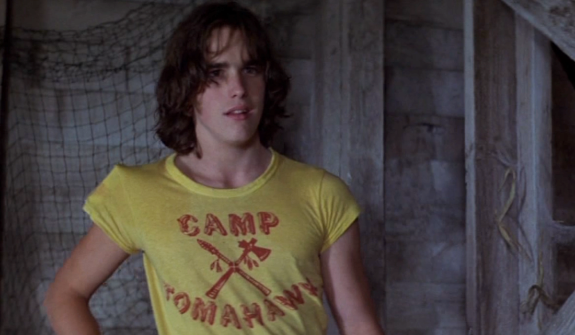
Little Darlings
FATIMA: In Little Darlings we see how the competitive aspect of camp life can be both self-affirming and destructive. What struck me the most when watching it now was how innocent it actually is. Despite the sexual bet that the plot revolves around – in which two girls compete to see who will be the first to lose their virginity – the film avoids exploitation of its characters to serve the premise, opting instead to focus on how the bet affects each of them. The bet allows both girls to form their own ideas about what sex means to them, away from the influence of their parents’ actions and even away from their peers, who pressured them to participate in the first place.
VERONICA: Little Darlings dramatizes the exceptionalism of camp: a time and space more potent for its brevity and finitude. So there’s a tension for me between the clear influence of Angel’s and Ferris’ home lives (played by Kristy McNichol and Tatum O’Neal, respectively)– further reinforced by the inclusion of “family day,” when discrete worlds collide – and what appears to be an utter lack of supervision or authority at Camp Little Wolf. Also contributing to camp’s exceptionalism, as in Dirty Dancing, is its status as a contact zone where girls of (cartoonishly) different socioeconomic contexts bunk together. This aspect lends the competition a sort of Olympic vibe for me, insofar as the outcome purports to measure what background – what “training” – best prepares girls to become women.
MANISHA: It is super interesting that the movie is more about the bet than the actual sex; it’s actually ends up being very touching! It also ends with Angel and Ferris becoming best friends instead of either of them ending up with the boy (or man) they thought they wanted. Camp is also the place where being a virgin (and therefore being innocent) isn’t desired. When we contrast that with Ferris’s mother’s laissez-faire attitude towards sex (as kind of a loose woman archetype), camp emerges as a place for experimentation and a shake-up of established rules and morals regarding girls’ sexuality and how it influences their reputations.
VERONICA: I love how hysterically sex suffuses the film, from locker room talk in the rest stop bathroom, to an over the top food fight, to girls screaming as they split open a stolen condom dispenser like a prophylactic piñata. Yet the emotional centre is Angel’s and Ferris’ tire swing confession, where both are moved to admit that ‘it’ – which stretches to include both doing it and not – was nothing like what books, movies, and rumours had suggested. “I’m not a woman,” says Angel to Randy (played by a baby and babely Matt Dillon), and it’s an oblique moment: she’s not just saying “I’m not ready,” as if recusing herself to a younger cabin; she’s rejecting the entire narrative. Which reminds me both of the queerness implicit to Little Darlings (and to the homosocial experience of girls’ camp, writ large) and of the extra-textual queer shadow cast by stars McNichol, O’Neal and Cynthia Nixon each having since come out.
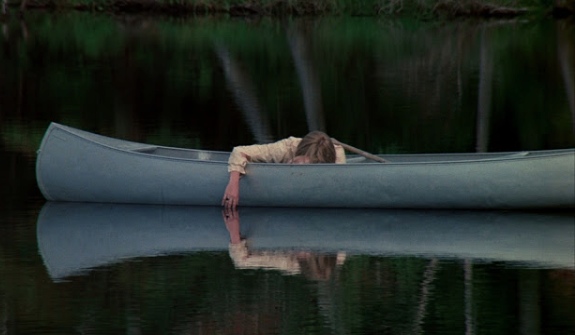
Friday the 13th
VERONICA: At the beginning of Friday the 13th, a couple of camp counsellors steal away from the fireside sing-along to fuck. Their snippets of conversation characterize sex as a privacy risk (someone will see) and a sort of rotation (does Mary Ann kiss as good as I do?). They make out and murmur while the subjective camera ascends the stairs. Here, sex is a tangle of bare legs. Their killer interrupts them, and – here’s a micro-study of sex in the slasher film – while the boy is dispatched quickly, the girl’s fear is protracted by slow motion and held by freeze frame.
FATIMA: Camp is the perfect setting for a cut-and-dried slasher film like Friday the 13th. In order for the film to work you need a secluded location with no adults so that a masked killer can get to work. I actually laughed through most of the film as I re-watched it, because I now have a whole generation’s worth of post-Friday the 13th slasher film knowledge of how it’s supposed to go down (including Wes Craven’s Scream, which injected so much humour and tongue-in-cheek meta-awareness to the genre). The element that led to Jason’s death is that the counsellors were busy having sex and didn’t realize that he was drowning. The new counsellors are paying for the sins of Jason’s past counsellors, the sexual freedom found at camp is turned into punishment, and the only survivor can be a girl who is supposedly unsullied by this.
VERONICA: The 1970s-80s slasher films are popularly known for a punitive attitude toward young people, intoxication, sex, young intoxicated people having sex, etc. But rewatching Friday the 13th, I thought about how simplified this has become in critical and popular discourse. Counsellor Brenda (Laurie Bartram) is literally reading a book in bed in a full long sleeved nightgown when cries for help draw her outside (and to her death). While there’s a fair share of penetrative imagery (thanks, archery range) and some inauspicious juxtapositions (such as god/sex, with the opening murder framed by a Hallelujah chorus and church bells, and death/sex, when the camera travels up to reveal dead Ned [Mark Nelson] right as Marcie [Jeannine Taylor] is seemingly coming in the bottom bunk), the killing impulse still feels chaotic, and relatively nondiscriminatory. Even when Mrs. Voorhees (Betsy Palmer) says, “They were making love when that young boy drowned,” indicts counsellor negligence – not quite the same as a moralizing punishment of sex in itself.
MANISHA: I had a really big cackle at the end of the movie when Jason’s mother says that the counsellors were too busy making love to save Jason, which just was so on the nose— as if sex was not already punishable by death throughout the rest of the movie. Unlike Little Darlings, sex becomes the focal point instead of the side plot. Throughout Friday the 13th, anyone who expresses sexual desire in any way (strip-Monopoly, being young and cute) is killed off, in a comically punitive way that we can see coming from miles away (the score helps too). Camp is a setting that seems like a perfect incubator for experimentation and freedom from everyday life, but here, that freedom comes at a price and the isolated location (that for other camp movies can be an ideal place for self-discovery) becomes a trap.
FATIMA: Do you think that the reason camp slasher films work well as a concept is because there’s something about summer camp and its associations with childhood innocence that makes it the ideal space for the puritanical punishment we’re talking about here? I’m just thinking of this in relation to other slasher films that take place in locations that don’t necessarily create those same associations in the minds of viewers, but still have the same elements: young people, sex, the “final girl.”
MANISHA: Yes! The disruption of space is super interesting to me too. The slasher film takes the idea of “surviving camp” very literally, as a transition from youthful innocence to adulthood. In the other movies, that survival is played for laughs, like “if they can make it through this wild and crazy time in this weird incubator, they can handle real life!” But in Friday the 13th, the “final girl” has to literally survive the onslaught of terror on her youth, only to emerge as a wiser, more sober figure at the end.
VERONICA: Fatima, it makes a lot of sense that camp slashers work because placing teenagers in an innocent space constitutes a spatial violation, transgressively repurposing the space somehow. But I think Manisha’s play on “surviving camp” also points to an alternative: that murder set at camp is less a transgression than a demonstration of precisely what kind of space this is: like Carrie’s depiction of high school as an embattled field of insecurity and violence. Something like Friday the 13th for me clarifies the violence of camp, or of group settings for coerced socialization (I’m reminded of Wednesday’s perspective on Camp Chippewa).
As Carol J. Clover writes in Men, Women, and Chain Saws (1992), the “final girl” trajectory is usually from wisdom and sobriety – which allow her to recognize danger and exercise caution – to “abject terror personified,” like Sally at the end of The Texas Chain Saw Massacre hysterically scream-crying in the getaway truck. The process is cruel because while she survives, said survival necessarily extends the duration of her fear and even torture, traumatizing her into some kind of hospitalization or conversion to killing. So if the “message” of slashers is, have sex at your own risk, it could also arguably be, play strip-Monopoly while you still can.
Manisha Aggarwal-Schifellite is a writer and editor from Toronto.
Fatima BG is a writer, community organizer, and co-host of the Black Girls Talking podcast.
Veronica Fitzpatrick is a writer, Ph.D. candidate in Film Studies at the University of Pittsburgh, and a founding co-editor of The Brink. She prefers the bottom bunk.

